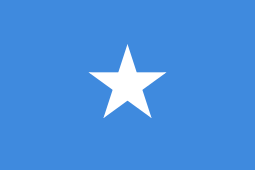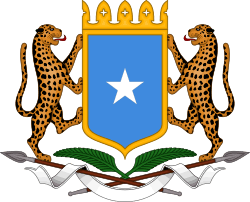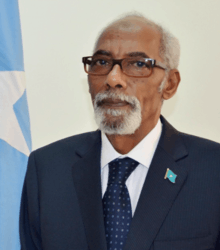Federal Government of Somalia
| Federal Republic of Somalia | |
|---|---|
 Flag
 Coat of Arms
| |
| Capital |
Mogadishu 2°2′N 45°21′E / 2.033°N 45.350°E |
| Official languages |
Somali Arabic |
| Government | Federal parliamentary republic under a provisional government |
| Mohamed Abdullahi Mohamed | |
| Hassan Ali Khayre | |
| Legislature | Parliament |
| Senate | |
| House of the People | |
| Establishment | |
| 20 August 2012 | |
| Currency | Somali shilling |
The Federal Government of Somalia (FGS) (Somali: Dowladda Federaalka Soomaaliya, Arabic: حكومة الصومال الاتحادية) is the internationally recognised government of Somalia, and the first attempt to create a central government in Somalia since the collapse of the Somali Democratic Republic. It replaced the Transitional Federal Government of Somalia on 20 August 2012 with the adoption of the Constitution of Somalia.
The Federal Government of Somalia was established on August 20, 2012, following the end of the interim mandate of the Transitional Federal Government (TFG).[1]
It officially comprises the executive branch of government, with the parliament serving as the legislative branch. It is headed by the President of Somalia, to whom the Cabinet reports through the Prime Minister.[2]
Structure
 |
|---|
| This article is part of a series on the politics and government of Somalia |
|
Constitution |
|
Judiciary |
|
The national constitution lays out the basic way in which the government is to operate.[2] It was passed on June 23, 2012, after several days of deliberation between Somali federal and regional politicians.[3] To come into effect, the constitution must be ratified by the new parliament.[4]
Under the new constitution, Somalia, now officially known as the Federal Republic of Somalia, is a federation.[5]
Executive branch
The President is elected by the Parliament. He or she serves as the head of state and chooses the Prime Minister, who serves as the head of government and leads the Council of Ministers. According to Article 97 of the constitution, most executive powers of the Somali government are vested in the Council of Ministers.[2] The incumbent President of Somalia is Mohamed Abdullahi Mohamed.[6] Hassan Ali Khayre is the national Prime Minister.[7]
Council of Ministers
The Cabinet is formally known as the Council of Ministers. It is appointed by the Prime Minister.[2]
Parliament of Somalia

The Federal Parliament of Somalia elects the President and Prime Minister, and has the authority to pass and veto laws.[2] It is bicameral, and consists of a 275-seat lower house as well as an upper house capped at 54 representatives.[8] By law, at least 30% of all MPs must be women.[9] The current Members of parliament were selected by a Technical Selection Committee, which was tasked with vetting potential legislators that were in turn nominated by a National Constituent Assembly consisting of elders.[10] The current Speaker of the Federal Parliament is Mohamed Osman Jawari.[11]
Judiciary
The national court structure is organized into three tiers: the Constitutional Court, Federal Government level courts and Federal Member State level courts. A nine-member Judicial Service Commission appoints any Federal tier member of the judiciary. It also selects and presents potential Constitutional Court judges to the House of the People of the Federal Parliament for approval. If endorsed, the President appoints the candidate as a judge of the Constitutional Court. The five-member Constitutional Court adjudicates issues pertaining to the constitution, in addition to various Federal and sub-national matters.[12]
Federal member states
Local state governments, officially recognized as Federal Member States, have a degree of autonomy over regional affairs and maintain their own police and security forces. However, they are constitutionally subject to the authority of the Government of the Federal Republic of Somalia. The national parliament is tasked with selecting the ultimate number and boundaries of the Federal Member States within the Federal Republic of Somalia.[5][2]
Education
The Ministry of Education is officially responsible for education in Somalia. As of January 2015, the institution is led by Khadra Bashir Ali.[13]
Healthcare
The Ministry of Health heads the country's healthcare system. As of January 2015, the institution is led by Hawo Hassan Mohamed.[13]
Media
The federal government has two main media outlets: Radio Mogadishu, the state-run radio station; and Somali National Television, the national television channel and Somali national news agency.
Military and police
The central government's Ministry of Defence is officially responsible for the Somali Armed Forces and its various subdivisions. As of January 2015, the Ministry is led by Abdulkadir Sheikh Dini.[13]
Capital
The constitution recognizes Mogadishu as the capital of Somalia. The Parliament of Somalia meets in the city, which is also the seat of the nation's Supreme Court. In addition, Mogadishu is the location of the presidential palace, Villa Somalia, where the President resides. The Prime Minister also lives in the city.
International relations

The Federal Government of Somalia is internationally recognized as Somalia's official central government. It occupies the country's seat in the United Nations, the African Union, and the Organisation of Islamic Cooperation (OIC). The Somali federal government has a Permanent Representative and Deputy Permanent Representative to the United Nations. It also has embassies in various countries.[14]
Additionally, there are various foreign diplomatic missions in Somalia. Ethiopia maintains an embassy in Mogadishu,[15] and consulates in Hargeisa in Somaliland[16] and in Garowe in Puntland.[17] Djibouti re-opened its embassy in Mogadishu in December 2010.[18] The following year, India also re-opened its embassy in the capital after a twenty-year absence,[19] as did Turkey.[20] Iran and the United Kingdom followed suit in 2013,[21] as well as Qatar and China in 2014.[22][23] Italy maintains a special diplomatic delegation and a Technical Mission to Mogadishu, and is scheduled to re-open its embassy in the city.[24] In 2013, Egypt likewise announced plans to re-open its embassy in Mogadishu.[25]
In January 2013, the United States announced that it was set to exchange diplomatic notes with the new central government of Somalia, re-establishing official ties with the country for the first time in 20 years.[26][27]
Passports
For travel, Somali citizens can obtain a Somali passport from government-designated locations or from Somali embassies abroad.
References
- ↑ "Somalia: UN Envoy Says Inauguration of New Parliament in Somalia 'Historic Moment'". Forum on China-Africa Cooperation. 21 August 2012. Retrieved 24 August 2012.
- 1 2 3 4 5 6 "Guidebook to the Somali Draft Provisional Constitution". Archived from the original on 14 August 2013. Retrieved 2 August 2012.
- ↑ "Somalia: Somali Leaders Adopt Draft Constitution". ANP/AFP. Retrieved 23 June 2012.
- ↑ "Somali leaders back new constitution". BBC. 1 August 2012. Retrieved 2 August 2012.
- 1 2 "The Federal Republic of Somalia - Harmonized Draft Constitution" (PDF). Federal Republic of Somalia. Retrieved 2 August 2012.
- ↑ "Somali lawmakers elect Mohamud as next president". Reuters. Retrieved 10 September 2012.
- ↑ "PM Sharma'arke officially takes office". Goobjoog. 25 December 2014. Retrieved 19 March 2015.
- ↑ "Somalia swears in historic new parliament". Al Jazeera. 20 August 2012. Retrieved 21 August 2012.
- ↑ Somalia Garowe conference comes to a close Archived June 12, 2012, at the Wayback Machine.
- ↑ Somalia: List of new parliamentarians leaked
- ↑ "Somali Parliament Elects Speaker for New Gov't". Voice of America. 28 August 2012. Retrieved 28 August 2012.
- ↑ "The Federal Republic of Somalia - Provisional Constitution" (PDF). Archived from the original (PDF) on January 24, 2013. Retrieved 13 March 2013.
- 1 2 3 "Nominated Ministers and Their Clans". Goobjoog. 21 March 2015. Retrieved 28 January 2015.
- ↑ "Somali Ministry". Ministry of Foreign Affairs.
- ↑ We urgently need an Embassy in Somalia Archived 2012-09-10 at the Wayback Machine.
- ↑ Ethiopian Trade Office Somaliland - Somalia
- ↑ SOMALIA: Ethiopia opens consulate in Puntland
- ↑ Djibouti Government Opens its Embassy in Mogadishu Archived 2016-01-16 at the Wayback Machine.
- ↑ Somalia: India Reopens Its Embassy in Country After 20 Years
- ↑ Press Release Regarding the Re-opening of the Turkish Embassy in Mogadishu
- ↑ "Britain Re-opens Embassy in Somalia". The Chosun Ilbo. 26 April 2013. Retrieved 26 April 2013.
- ↑ "Qatari diplomat in Mogadishu meeting". Gulf Times. 24 August 2014. Retrieved 13 September 2014.
- ↑ "SOMALIA: China officially opens embassy in Somalia today". Raxanreeb. 12 October 2014. Retrieved 12 October 2014.
- ↑ Italy first in West to reopen embassy in Somalia Archived March 15, 2012, at the Wayback Machine.
- ↑ "Egypt to re-open embassy in Mogadishu". Sabahi. 11 March 2013. Archived from the original on 13 March 2013. Retrieved 12 March 2013.
- ↑ "US set to formally recognise Somali government after 20-year hiatus". Reuters. 17 January 2013. Retrieved 18 January 2013.
- ↑ "U.S. Set to Recognize Somali Government". VOA. 17 January 2013. Retrieved 18 January 2013.